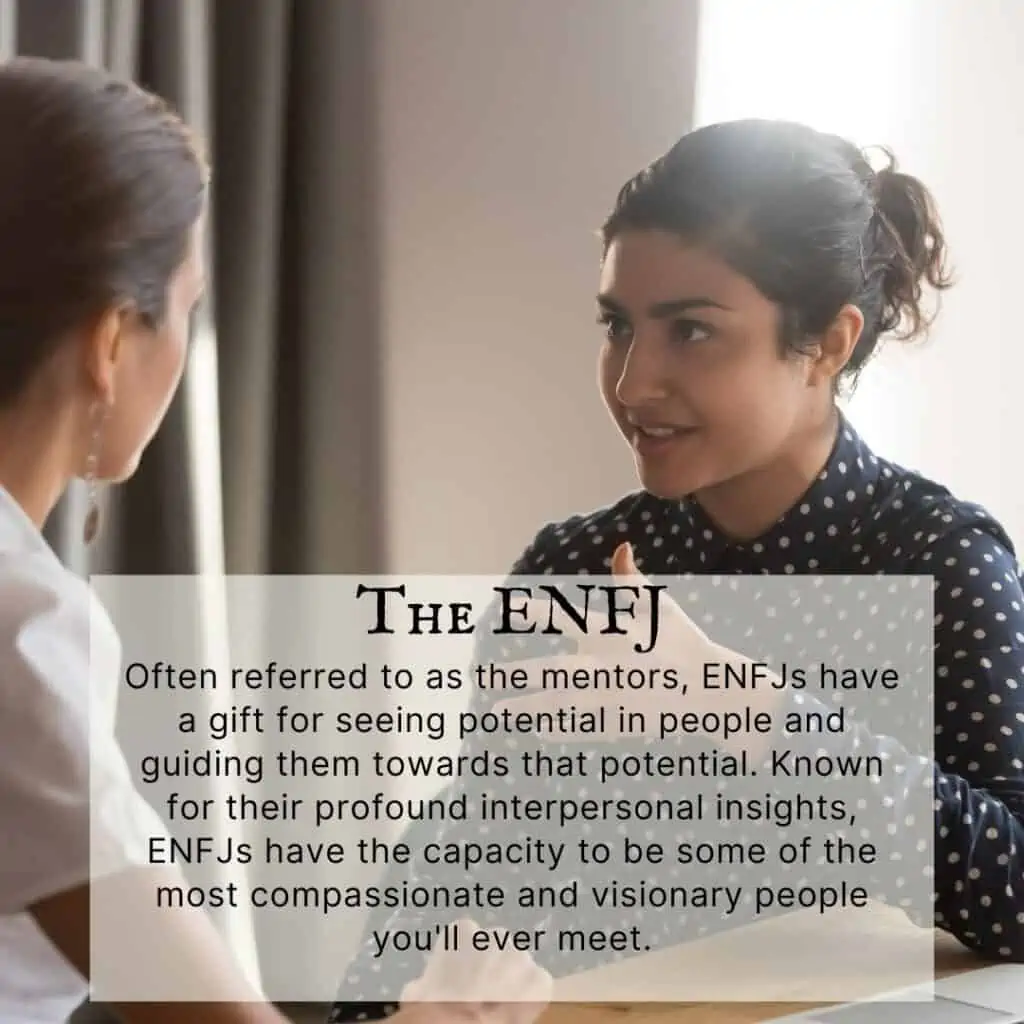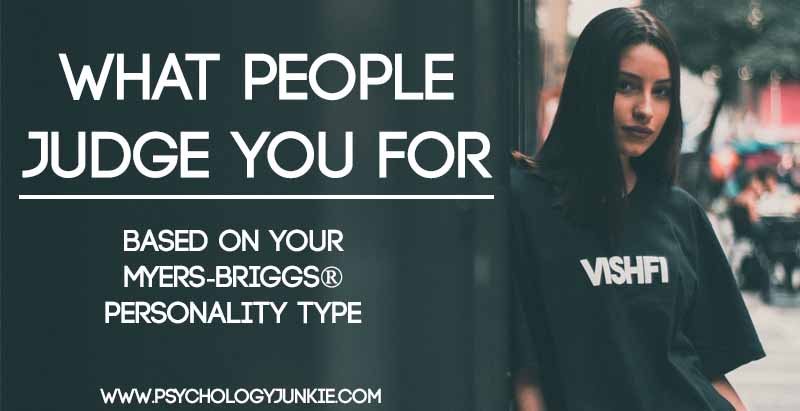10 Signs of an Unhealthy ENFJ
Often referred to as the mentors, ENFJs have a gift for seeing potential in people and guiding them towards that potential. Known for their profound interpersonal insights, ENFJs have the capacity to be some of the most compassionate and visionary people you’ll ever meet. Famous ENFJs like Martin Luther King Jr. have spoken out against injustice without alienating those who needed to be convinced of the righteousness of their cause.
However, like all personality types, ENFJs can become unhealthy. In today’s article we’re going to explore ten signs that an ENFJ is in an unhealthy place. But before we begin, let’s look at some of the reasons why ENFJs can become unhealthy.

Not sure what your personality type is? Try out our most highly recommended personality questionnaires:
- You can take our free personality questionnaire here
- You can take Personality Hacker’s highly accurate personality questionnaire.
- You can take the official Myers-Briggs Type Indicator® for $49.95
This article contains an affiliate link to a questionnaire on Personality Hacker. If you purchase one of their courses, I get a small kickback that I can use to pay for hosting and other demands of this site. I only recommend courses I love.
Table of contents
- Some of the Reasons Why ENFJs Can Become Unhealthy:
- 10 Signs of an Unhealthy ENFJ
- #1 – They Gossip to Get Back at People
- #2 – They Overlook Facts
- #3 – They are Impatient
- #4 – They are Rash and Impulsive
- #5 – They are Overly People-Pleasing
- #6 – They Create Us vs. Them Situations
- #7 – They are Controlling
- #8 – They Are Incapable of Healthy Conflict
- #9 – They See Different Personalities as “Wrong” or “Selfish”
- #10 – They Are Hyper-Sensitive
- Self-Help Tips for ENFJs:
- What Are Your Thoughts?
- Other Articles You Might Enjoy:
Estimated reading time: 10 minutes
Some of the Reasons Why ENFJs Can Become Unhealthy:
One-Sidedness:
Some people grow up prioritizing what comes naturally to them and avoiding anything that seems tricky, uncomfortable, or challenging. Rather than stretching their minds, they live within an echo chamber and spend time only with people who agree with them. Some times this is intentional and other times it’s a natural outcome of one’s early environment. Perhaps this ENFJ had parents who coddled them and arranged everything to their preferences, as an example. They may be confused or disgusted by people who see the world differently or have different personality types, seeing the way they do things as inherently “wrong” or just simply irritating. This kind of a person can grow up to be one-sided; enjoying the parts of their personality they use naturally and avoiding the parts of their personality that are less enjoyable for them. These repressed parts of their personality can show up later as projections, paranoia, or “all or nothing” viewpoints.
Loops:
When a person is in a “loop” it means that they are favoring either the extroverted or introverted sides of their personality to the exclusion of other sides. In the case of an ENFJ, it could mean that they’re valuing their Extraverted Feeling and Extraverted Sensing cognitive functions, while repressing their Introverted Intuition and Introverted Thinking. This can result in the ENFJ being people-pleasing, overly-social, meddling, impulsive, or too detached from themselves. You can find out more about loops here: What You’re Like in a Loop, Based On Your Myers-Briggs® Personality Type.
Stress:
Chronic or intense stress can cause someone to lash out in unexpected ways. During stress people often behave more true-to-type or in an exaggerated way, trying to solve the problem by relying on their most natural way of thinking. Other times they can fall into the grip of their inferior function. When this happens, they start behaving like their opposite type in challenging ways that confuse even them.
Now that we know some of the reasons that ENFJs can be unhealthy, let’s look at 10 of the signs that an ENFJ is unhealthy. Keep in mind, even a mature, healthy ENFJ may have moments of being unhealthy if their day is especially rough or other challenging factors are at play.
10 Signs of an Unhealthy ENFJ

#1 – They Gossip to Get Back at People
ENFJs at their best know how to deliver criticism with compassion and patience. In an unhealthy state, ENFJs will do nearly anything to avoid a conflict. However, rather than holding in their criticisms entirely, they may gossip behind peoples’ backs and complain about people, eventually looking for offenses so they can maintain their negative gossip of the person who has hurt them or let them down. The rush of connecting with someone over shared disgust, offense, or self-righteousness can be appealing to the unhealthy ENFJ.
#2 – They Overlook Facts
ENFJs are idealists at heart and, at their best, they go after their dreams without losing a sense of practicality. However, at an unhealthy level, they may bend facts or merely overlook them in order to stay in love with their dream. This can show up as believing someone can be changed, even if they show no evidence of being willing to do so. It could also show up as going after a career path even when they don’t have the resources for it to make sense.
#3 – They are Impatient
ENFJs can have a very intense, in-charge energy paired with a big dose of warmth and friendliness. They enjoy going after their dreams and crave a sense of momentum and action. However, when ENFJs are unhealthy they get so fixated on momentum and action towards their goals that they are impatient with people. They rush people to get on the same page as them and overlook details in an effort to get things done as quickly as possible.
#4 – They are Rash and Impulsive
ENFJs in a balanced state are friendly, generous, and magnanimous. They balance their charismatic, extroverted nature with a depth and insight that gives their lives a sense of the profound. When ENFJs are in a loop they get stuck in the extroverted side of their personality and become totally wrapped up in what’s happening around them and the relationships they care about. Rather than taking time to reflect, ponder, and plan they may make rash decisions based on their emotions in the moment.
#5 – They are Overly People-Pleasing
ENFJs naturally want to be liked and appreciated. It feels good for them when they are surrounded by people who enjoy their company and they strive to maintain these relationships. However, at an unhealthy level, ENFJs may put the needs of others above their own to such an extent that they lose track of what they need and want. They may find themselves in relationships that are one-sided or codependent.
#6 – They Create Us vs. Them Situations
ENFJs are typically very good at reading people and they have a knack for quickly understanding the dynamics of a group. In a healthy state, they use these skills to bring people together and create harmony. In an unhealthy state, however, they may use their insights into people to create division and conflict. They may gossip about others behind their backs or play one person off against another in a way that creates tension and drama. The emotional intensity and companionship they feel in an us vs. them situation can become addictive when they’re at an immature place in their lives.
#7 – They are Controlling
ENFJs are often referred to as visionary and idealistic. Like Morpheus in “The Matrix” they see the world for what it could be and they have the ability to inspire others to follow them on the journey to make their vision a reality. In a healthy state, they use their natural charisma and persuasive skills to win people over to their side. When they’re unhealthy, however, they may use manipulation and control to get people to do what they want. They may be overly opinionated and push their own agenda even when it’s not in the best interest of those around them.
#8 – They Are Incapable of Healthy Conflict
Healthy ENFJs know that conflict is a part of life and can be a means of getting closer to another individual. They approach conflict with some hesitancy in many cases, but they still power through with as much empathy and insight as they can.
In an unhealthy state, ENFJs simply avoid conflict. They will instead either gossip about the person that they’re offended by or they will nurse resentment and anger and their unhappiness will show up in passive-aggressive or self-righteous ways.
#9 – They See Different Personalities as “Wrong” or “Selfish”
At their best, ENFJs enjoy the kaleidoscope of different people that exist in the world. They are curious about peoples’ differences and enjoy hearing a variety of different perspectives. To the healthy ENFJ the more perspectives they can gain the broader and richer their world becomes.
In an unhealthy state, ENFJs ostracize people who are different from themselves. They may see people with Introverted Feeling (FP and TJ personality types) as selfish or narrow-minded. When it comes to Sensing personality types they may see them as shallow or mundane and they may label Thinking types as uncaring and insensitive, even if this is far from the case. Rather than taking the time to get to know people who are different from themselves, these ENFJs will simply believe that those people are “wrong” and will see everything they do in a negative light.
#10 – They Are Hyper-Sensitive
ENFJs are highly sensitive individuals and they feel things very deeply. This can be a strength as it allows them to be compassionate and understanding towards others. It can also be a weakness, however, as they may take things too personally or become overwhelmed by their emotions and unable to focus on their essential tasks. In an unhealthy state, ENFJs may become codependent on others for validation and they may become overly attached and needy. They may also have difficulty setting boundaries and may allow others to take advantage of them.
Self-Help Tips for ENFJs:
If you’re an ENFJ who finds yourself in an unhealthy state, there are some things you can do to get back on track. Here are a few tips:
- Spend time alone regularly to recharge your batteries. Yes, you are an extrovert and it’s crucial to spend time around a variety of people – but don’t overdo it. Take time to reflect, imagine, and simply “be” without distractions (especially devices). Use this time to tap into your values and what matters to you as a person. Think about what you believe in. Consider the choices you’re making and whether they are in line with the kind of person you want to be in the end. Meditate if you can. Calm your body and allow yourself to be mindful of all the good things you have.
- Learn to differentiate between healthy and unhealthy criticism or conflict. If someone is criticizing you in a way that feels constructive, try to listen with an open mind. If they are being excessively negative or seem to be criticizing you for the sake of it, then walk away. Not everyone will understand or accept you – and that’s okay. Don’t waste your time and energy on those who don’t see your worth and simply want to bring you down so they can feel better about themselves. Ask yourself, “Is this criticism true? Is it helpful? Am I being triggered for a good reason or simply because I don’t want to have my opinion of myself challenged?”
- Spend time around a variety of people. This should be an easier one for you because you enjoy people naturally. Make sure you’re not living in an echo chamber of people who only share your same opinions. Try to vary your ways of interacting with people; maybe you could join a book club, a religious group, a class, an online group, or an art therapy group!
- Practice asserting yourself and what you need or want. When you feel yourself being taken advantage of, rather than nursing resentment or talking to someone else about it, consider directly stating what you need or want to the other person. It might feel scary at first, but the more you do it the more you’ll grow comfortable with it. The people in your life who care about you don’t actually want to take advantage of you(at least not consciously). Holding in hurts or being passive-aggressive will only hurt your relationships and yourself in the long run.
What Are Your Thoughts?
Did you enjoy this article? Do you have any thoughts or experiences you’d like to share? Let us and other readers know in the comments!
Discover more about your personality type in our eBooks, Discovering You: Unlocking the Power of Personality Type, The INFJ – Understanding the Mystic, The INTJ – Understanding the Strategist, and The INFP – Understanding the Dreamer. You can also connect with me via Facebook, Instagram, or Twitter!
Other Articles You Might Enjoy:
24 Signs That You’re an ENFJ, the Mentor Personality Type













Very true and insightful. I was in an unhealthy work environment for four years and moved from an enfp to an enfj. That was the first major shift in personality in the twenty years I have taken mb. I’m still learning my new self. Thank u so much
OMG , i’m an ENFJ and this article really freaked me out and scared me , especially when it said about ENFJ avoid conflict , i obviously hate fighting with someone , i hate loud noises and when i am fighting with someone , it stresses me , so conflicts are necessary ??? I find it hard to believe that and i would never gossip anyone , i want to be humble , i don’t wanna be unhealthy
I agree but sometimes conflict is good because by having a agruement with someone ( not an actual fist fight😂) can be good. Positive Conflict can be a way for you and the other person to build a relationship and recognize your guy’s differences and embrace them. Positive Conflict can help you in many ways, one of them being optimistic. By being optimistic and open to other opinions than your own will help you build good friendships and helps you from being arrogant by acknowledging other beliefs that your own. Positive Conflict also strengthens your problem solving skills. Sometimes clearing up a disagreement or something that bothered you that a certain someone did can also help strengthen your friendship/relationship by talking in a civil matter those problems can be taking care of. By simply not voicing your disagreements can lead to miscommunication and confusion. In times conflict is not good but when it is voiced in a mature manner it can be very beneficial and needed. I’m an ENFJ-A so I definitely know where you’re coming from but try and remember to speak your opinions and to embrace differnaces🌱🌾